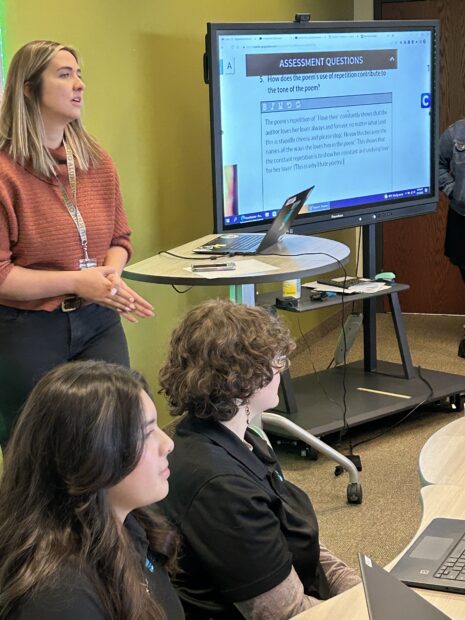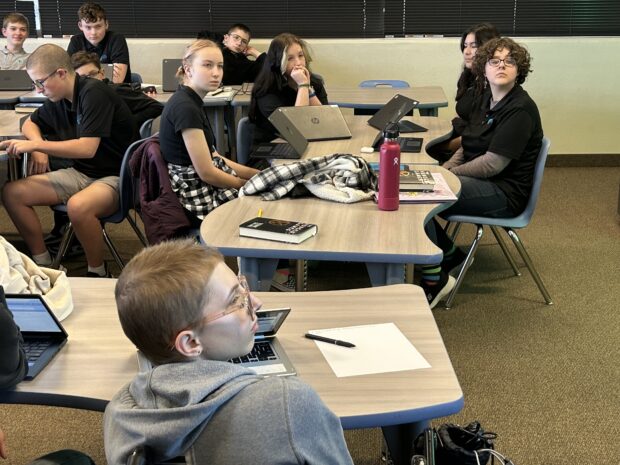As Bluum awards the last federal grant funds that five years ago kicked off the rapid expansion of charter schools, the organization predicts 2,800 more seats and eight more schools than originally promised.
While those results can’t be celebrated until the last six schools are built and the other 22 completed schools finish growing, Bluum expects to fly by their expansion expectations, made to the U.S. Department of Education in 2018.
And with a new Department of Education grant application process currently underway, and millions of dollars more of federal grant money up for grabs, Bluum is back to work looking for opportunities, new innovations and partnerships. The organization has not applied yet, but expects to make that decision this spring.

In 2018, the money Bluum used to grow charter schools came from a $22 million federal grant awarded for Idaho’s Communities of Excellence Federal Charter Schools Program, which led to the expansion of high-quality charters across the state.
In the final round of that federal program, four charter schools were awarded $1.9 million in 2023 to provide 1,702 seats for new students: Elevate Academy East Idaho, Idaho Falls; Idaho Novus Classical Academy, Avimor; Pinecrest Academy Lewiston, Lewiston; Promise Academy, Middleton.
The entire $22 million was allocated over five years with the goal of starting 20 new schools and providing 8,650 seats for new students.
“We were a rapidly growing state, and we had school districts that were bursting at the seams that needed help building new school capacity,” said Bluum CEO Terry Ryan.
“And that is a tremendous opportunity to innovate. When you have growth in demand for new schools, that’s a great opportunity to try to create some new choices for families,” he added.
Bluum is a nonprofit that supports education and helps develop charter school growth throughout Idaho.
Ryan expects to surpass the original five-year goal of 8,600 new seats.
Bluum awarded funds to expand five schools, replicate three existing charter models, and open 20 new schools. When all the schools are built and done growing, Ryan anticipates providing 11,467 new seats throughout Idaho — about 33% more than promised.
With 21% of the schools not yet built, and most of the others still growing, as of November 2022 the actual number of new seats is 6,302, according to a report provided by Bluum’s CFO Marc Carignan.
The difference between the new seats Bluum schools are providing versus what they promised is a strategic model: design and then build schools for future growth, but start with K-6. As school enrollment increases and higher grades are added, the infrastructure already exists to handle new students, Carignan explained.
Carignan also pointed out rural communities selected for charter growth — places like Avimor, Salmon, Hayden and Fruitland. Approximately 41% of the new seats created through the grant fund are located in rural communities, which met their rural outreach goal, Carignan said.
The following list outlines how the funds were dispersed in seven rounds.
- In March 2019, five schools were awarded subgrants for $800,000 each.
- In September 2019, six schools were awarded subgrants ranging from $133,224 to $1,250,000.
- In April 2020, two schools were awarded subgrants for $800,000 each.
- In December 2020, two schools were awarded subgrants for $800,000 each.
- In May 2021, seven schools were awarded subgrants ranging from $376,085 to $800,000.
- In June 2022, two schools were awarded subgrants ranging from $222,396 to $837,500.
- In February 2023, four schools were awarded subgrants ranging from $229,428.00 to $800,228.
According to Carignan’s student enrollment report, since the 2018-19 school year, all new charter school seat growth has been in Bluum schools.
Ryan said Bluum’s leadership and initiatives represent one of the most innovative education organizations in Idaho.

More partnerships and schools of diversity
The nonprofit’s future direction is dependent on if their local funding partners agree and want Bluum to reapply for those federal grants — that $22 million Department of Education grant program.
“None of this would be possible without the J.A. and Kathryn Albertson Family Foundation,” Ryan said, because the foundation’s money was leveraged with federal money to offer even more opportunities.
While Bluum will continue focusing on new school initiatives in communities that are growing quickly, Ryan said they hope to meet student needs through partnerships and expanded services.
“Growth has slowed but there’s still demand for new schools, and rural is still an area in need,” Ryan said.
One possible direction Ryan noted is partnering with school districts whose bond proposals failed. Because these districts are experiencing high enrollment growth, Bluum could help develop and build new schools there.
Three districts who already embraced this partnership, Ryan said, are Middleton, Kimberly and Bonneville. All three districts authorized Bluum charters in the past two years. And there are other districts thinking about authorizing, he said.
Another possible direction is building more diverse charter schools to equal or exceed the local school district’s demographics. Examples of that diversity include students with special needs, learning English as a second language, who come from poor households, and with diverse cultural backgrounds.
These new schools might offer more food services and meet transportation needs with buses, Ryan said.
Members of Idaho’s Communities of Excellence consortium include Bluum, the J.A. and Kathryn Albertson Family Foundation, the Idaho State Board of Education, the Idaho Public Charter School Commission, and Building Hope, a national charter school facilities financing nonprofit organization. Disclosure: Idaho Education News and Bluum are funded by grants from the J.A. and Kathryn Albertson Family Foundation.
